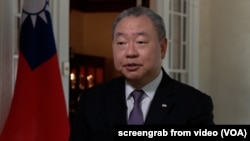It has been more than a month since Lai Ching-te took office as Taiwan’s newly elected president. Since the people of the self-governing island elected Lai in January, China has been increasing its pressure on Taiwan. Beijing considers Taiwan a part of its territory and views Lai as a “separatist.”
China’s ambassador to the U.S, Xie Feng, did not respond to VOA’s request for an interview last year when he arrived in Washington. VOA sat down with Taiwan’s top envoy to the U.S., Alexander Tah-Ray Yui, to talk about Lai’s foreign policy vision, China’s policies in the South China sea and new Chinese guidelines advocating for the punishment of those strongly supporting Taiwan independence. Also discussed was artificial intelligence and Taiwan’s influence in the Caribbean, where five countries have diplomatic ties with the island.
This interview has been edited for clarity and brevity.
VOA: As a representative of Taiwan in the U.S., what is the single most important thing you hope to accomplish here?
Alexander Tah-Ray Yui, Taiwan’s top envoy to the U.S.: Be it security, defense, be it technology, culture, education, etc. — and it's been steadily growing — obviously, my wish to accomplish here is to reach out, not only to the government, to Congress, but also to the American people to show that Taiwan-U.S. relations are relevant and are important for both of us. It's reciprocal, beneficial for both peoples, and we'll continue to promote that.
VOA: There's been mounting pressure from China, especially since the new [Taiwan] president started his office. What are some of the most challenging aspects of your diplomatic work here in the U.S., especially during an election year? And do you feel that pressure from China?
Yui: After President Lai Ching-te’s assumption on May 20th, things have gotten even more aggressive — [China] conducted military maneuvers around the island, and the presence of military airplanes and ships, near and around our territorial waters is constant. At the same time, PRC [People’s Republic of China] has been conducting what we call “lawfare” — law warfare — lately. [On] June 15th, they [China] implemented the Coast Guard Law number three, which in that law, again, I'm just loosely interpreting, [the] Chinese Coast Guard, using that law, can arrest and detain all within their territorial waters, which includes the whole South China Sea, East China Sea, etc., detain foreigners, seamen, if they deem that they’re in unlawful activities. They can detain them [for] up to 60 days without due process.
[On June 21] they [China] announced the 22 suggestions on penalizing Taiwan independence. Any Taiwanese — or actually any person, even foreigners — who are aiding, abetting, promoting Taiwan independence could be under these penal sanctions. They can be arrested, put under judicial process — if even in absentia — and the most it could be, [is] under death penalty sanctions if [they are] deemed extreme pro-independence movement supporters. Again, they're using [the] law to justify that everything they claim is theirs. My government announced that we are elevating the travel warnings to orange, which is second highest level of warning to our citizens to not make unnecessary travel to mainland China, Hong [Kong] and Macao because of this.
You mentioned it is election season for the United States. Obviously, we all watch it with a lot of interest, a lot of attention… But we're certain that no matter what the outcome of the elections, the relationship between Taiwan and the United States will continue to grow.
VOA: On to technology, Taiwan has been a world leader in semiconductors. China has been trying to be the global leader in artificial intelligence. How does Taiwan plan to compete with China?
Yui: Taiwan has a lot of relevance in terms of the AI revolution. China has been trying to, doing a lot of work, to advance AI … on microchips, semiconductors. They've devoted a lot of resources, a lot of money, a lot of manpower to try to replicate — I'm not saying overcome — just to replicate what Taiwan is doing. And so far, they have not been able to do so. So, it's important for us to maintain this superiority over mainland China. Because technology has to be used for good. It has to be used for exploring, expanding human imagination and benefits instead of being used to control its own people.
VOA: China has been active in the Caribbean with its infrastructure and investments. Some analysts even call it a key battleground for China to isolate Taiwan in the Caribbean. What is Taiwan's position?
Yui: PRC has been utilizing the Road and Belt Initiative to try to bring Chinese state-owned companies to build this large and often unnecessary infrastructure, through Chinese financing at high costs. What we are doing and what other countries — the United States and Europe — is that we offer a different alternative to these kind(s) of developments, which is more humanistic. We've always been allies offering through our technical commission the necessary cooperation that they need in terms of medical assistance, education, technology, agriculture, etc. [This] is what they really need and not all these humongous, unnecessary projects that cost a lot of money.












